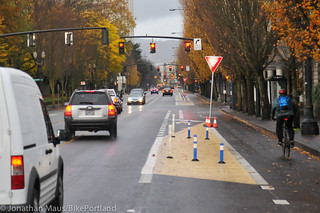From my perspective, the most positive and important project (in terms of improving bicycle access) the Portland Bureau of Transportation (PBOT) has completed in many years is their redesign of NE Multnomah Street. The project not only put the street on a serious diet — from five standard lanes and narrow bike lanes to three standard lanes and wide, protected bike lanes — its transformation was spearheaded by unusual suspects. Instead of being pushed for by citizen activists and advocates, the project was largely pushed forward by powerful, local business interests*.
The road to this project was bumpy; but now that the dust has settled it seems, so far at least, like a success. Given that Portland has suffered its share of controversy over road projects that include significant bike access improvements, I’ve been anxious to see how the media tells the story. Yet surprisingly, so far the Multnomah project hasn’t gotten much attention at all.
Over at the Green Lane Project blog, local writer (and Portland Afoot founder and sometimes BikePortland contributor) Michael Andersen did a great job going into more detail on how business leaders helped make the project happen. Beyond BikePortland, that’s the most in-depth reporting I’ve seen on the project.
Portland’s largest news source, The Oregonian, has yet to cover the changes to the street in detail. However, their commuting columnist Joseph Rose recently answered a reader’s letter about it. The reader was upset that the redesign was causing gridlock after Blazers games. “It’s messed up!” the reader exclaimed.
In his answer, Rose said that PBOT, “… isn’t really into you taking that route as part of your daily car commute,” and that the project, “aims to discourage drivers who aren’t headed to the mall, a movie or an NBA game from taking the route.” While acknowledging that “some drivers may not like it,” Rose also reported that it’s getting “raves” from many people. (Also worth mentioning is the comment sections includes several supportive voices.)
Beyond its functional success and the fact that it was supported from the get-go by people traditionally opposed to road diets, the most important part of the Multnomah project might be its public verdict. As a new Mayor and new members of Council take the reigns at City Hall, we need successful demonstrations like this now more than ever. Mayor Hales keeps talking about “getting back to basic services” and the need for PBOT to “rebuild the public’s trust.” Well, for just over $200,000, PBOT radically transformed a major street through an important business corridor and it was all done in the name of revitalizing the economic potential of the area. If that’s not how to get back to basics and get the community on your side, I don’t know what is.
(*Note: It’s important to consider that the real estate developers and other business interests that came to the table for this project, didn’t do it because they are gung-ho about bicycling in general. They actually got a pretty sweet deal. They got 20 more paid parking spaces and they got major improvements to a street that doesn’t need all the lanes it used to have. Not saying their role wasn’t important, just that, to call these folks bike advocates is a bit of a stretch. — Jonathan)


